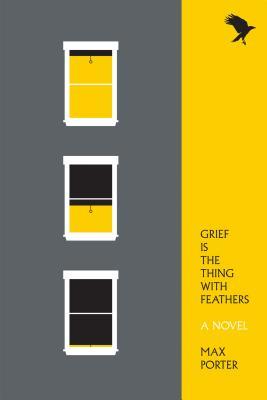Publisher: Graywolf. June 7, 2016.
Pages: 128
Genre: Literary Fiction
Source: Publisher
ADD TO GOODREADS
BUY FROM INDIEBOUND
BUY FROM BOOK DEPOSITORY
In a London flat, two young boys face the unbearable sadness of their mother's sudden death. Their father, a Ted Hughes scholar and scruffy romantic, imagines a future of well-meaning visitors and emptiness.
In this moment of despair they are visited by Crow - antagonist, trickster, healer, babysitter. This self-described sentimental bird is attracted to the grieving family and threatens to stay until they no longer need him. As weeks turn to months and physical pain of loss gives way to memories, this little unit of three begin to heal. -Goodreads
Without thinking about it, I read Max Porter's debut Grief Is the Thing with Feathers really, really close to Father's Day. For the past 12 years I've been coping with the loss of my father. It's been a long journey of trying to acknowledge it, then trying desperately not to acknowledge it, and eventually trying to find my way back to the experience through writing about it. It's always been something with me, constantly changing me, whether I was willing to accept it or not.
Through its fable-tones, strange format, and fragmented stream-of-consciousness writing (think Dept. of Speculation), this book is the closest I've ever read to capturing the feelings of grief. We get to be in the head of the father, the kids, and the magical Crow who inhabits their home. The death of the mother in this family shifts them into an entirely new world that nobody else can touch.
1. // You're constantly trying to rationalize the loss.
After the advent of laser surgery but before puberty, before self-consciousness, before secondary school, before money, time or gender got their teeth in. Before language was a trap, when it was a maze. Before Dad was a man in the last thirty years of his life. Really, on reflection, the best possible time to lose a mom. - BoysNo, there's no good reason why my dad died when he did. No, not everything happens for a reason. Will that stop me from having pretty much the identical thoughts as Max Porter captured above? Definitely not. So much of the boys behavior parallels that of me and my brother.
2. // You support your family without even realizing it.
They offer me a space on the sofa next to them and the pain of them being so naturally kind is like appendicitis. I need to double over and hold myself because they are so kind and keep regenerating and recharging their kindness without any input from me. - Dad talking about Boys
I was eleven when my dad died. I was too young for a lot of things. Only now can I look back and try to form an image in my mind of how others were affected by the event. I didn't then see my dad as a person or my mom as a person, really. They were dad and mom. I know now that my mom was going through an incredible hardship. And while she had to be completely overwhelmed with everything going on, including worrying about us, I can only hope that we helped her find joy every once in a while like she did for us during that time. Max Porter does an impeccable job capturing all of the intricacies of being a parent while being a person who just lost the love of their life and their best friend.
3. // It's not something you ever really get over.
Grief isn't something that ever truly ends. It evolves. And that's ok.
There are so many more things that Porter got right about grief, but those are three that I can articulate.There are things about this book that I only sort of felt like I understood. I feel like I need to go back and critically read basically all of Crow's parts. It would probably help if I had read Sylvia Plath and Ted Hughes. I'm sure there's a ton of stuff I'm missing. But I also enjoyed just letting Porter's beautiful writing flow over me for about an hour and then sobbing like a baby when it was over.

